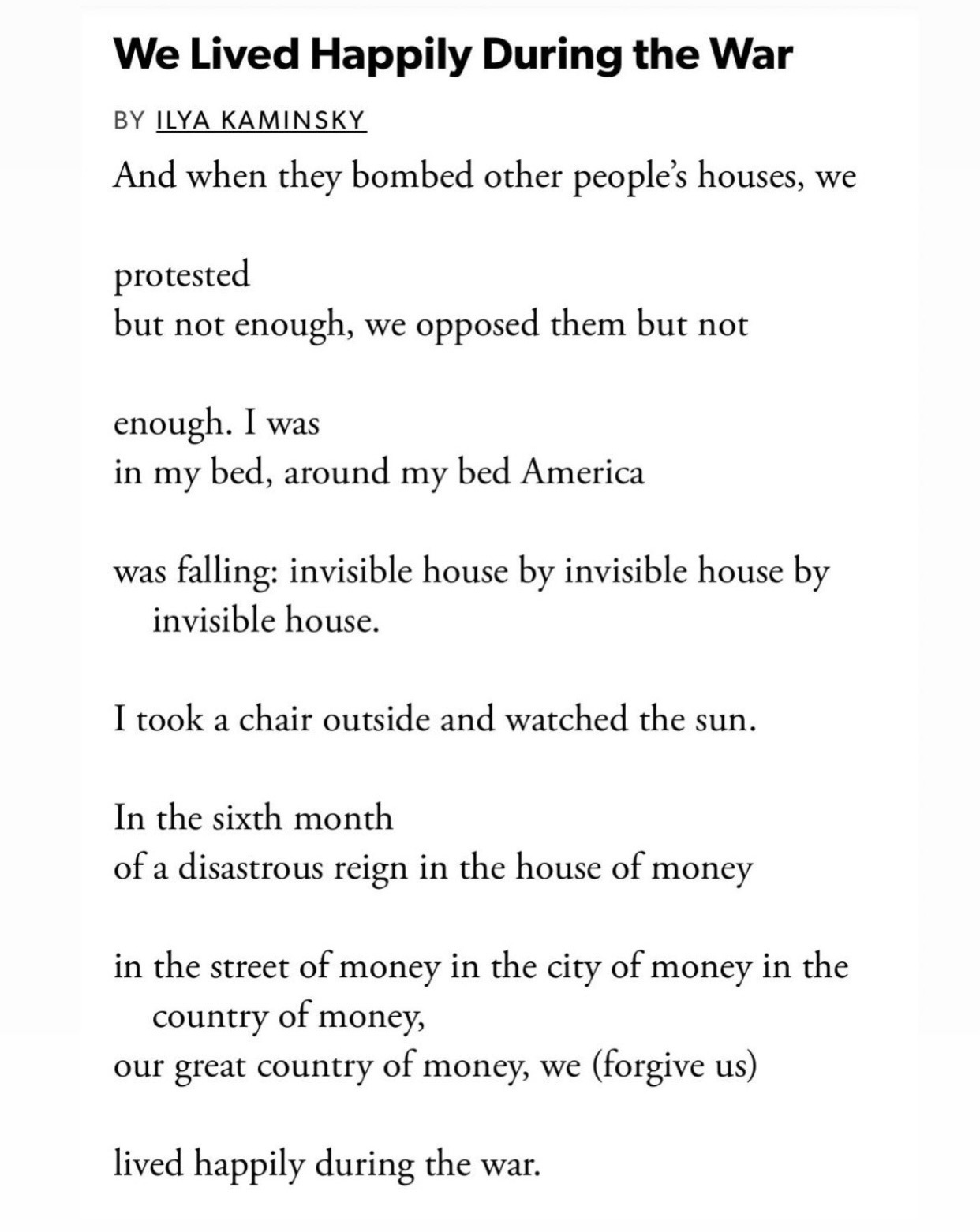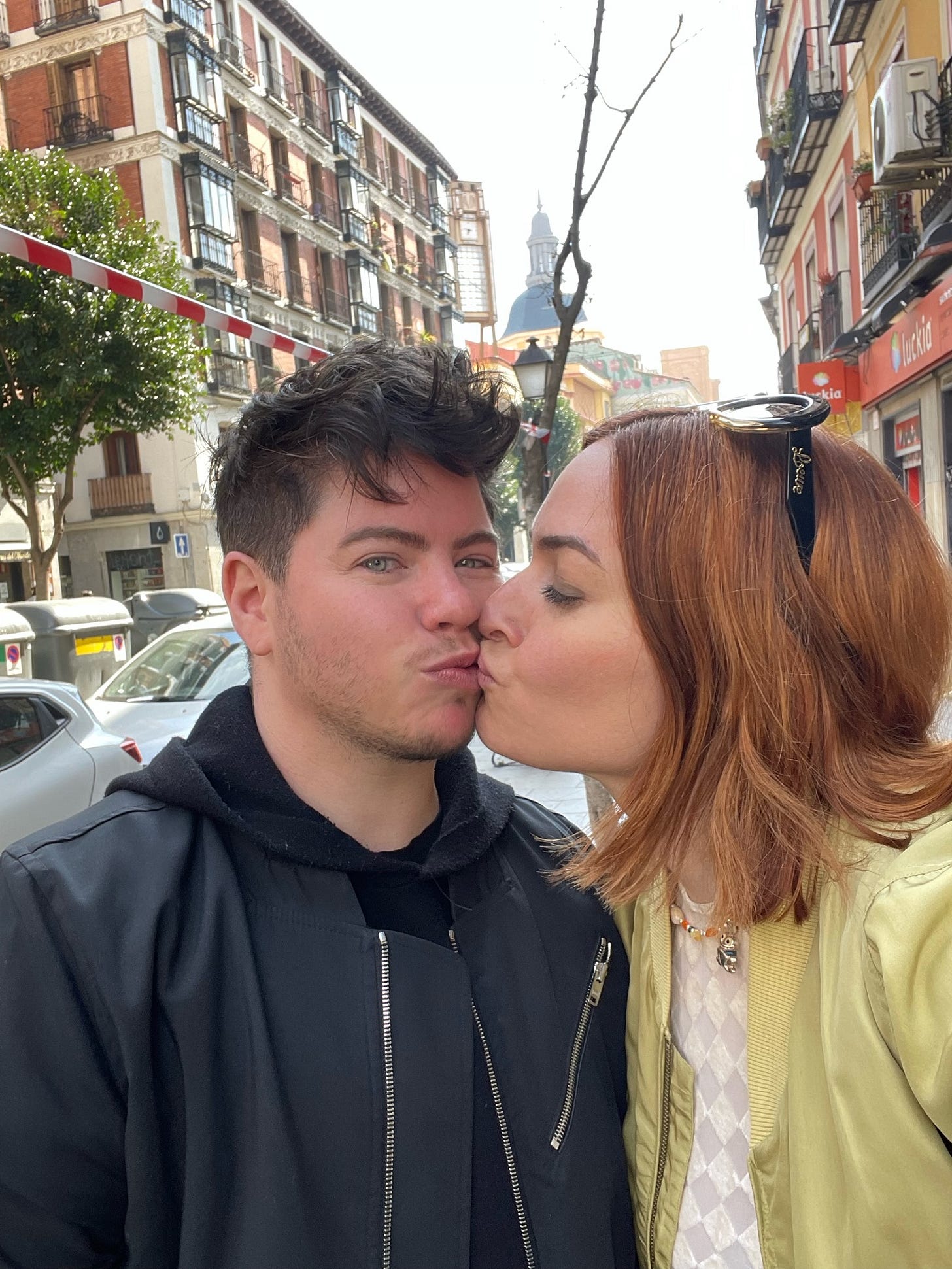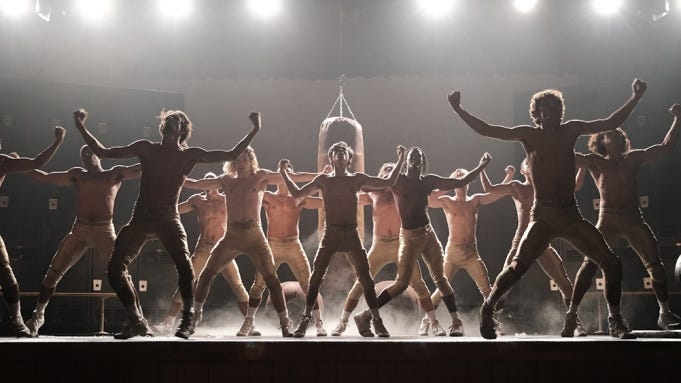Issue 17: The Students of Euphoria Bi 🏫
On fictional theater budgets and coming out as bisexual, plus Macy Harder interviews legendary bicon Madison Werner!
Whew. The fucking world, amirite? My heart aches for Ukraine—for the artists and teachers and children who have become refugees, the queer people who remain trapped by gendered judgements and laws, the Black and brown people who have been forced off trains in disgusting displays of racism. I can’t stop thinking about a Ukrainian twenty-something I saw on MSNBC who said she grabbed her dog instead of any possessions when she fled. I’m devastated for trans kids in Texas, Utah, and anywhere else white cis TERFs are signing horrific bills into law. I’m praying for all queer people in the state of Florida who deserve to scream “gay” at the top of their lungs.
Here’s a poem I keep thinking about by Ukrainian-American writer Ilya Kaminsky:

Last week, Brinley and I took a vacation to Madrid that we’ve had planned since August 2021—it was originally supposed to take place in December (exactly two months after my book launch) but then I got COVID and everyone got COVID and the rest is history. I couldn’t believe the trip would actually happen this time, and refused to believe it until we were literally on the flight, uncomfortably laying across each other for seven-ish hours. Aside from flights, the trip was only Friday-Tuesday, which was far too short (that’s what you get when you base your schedule around $350 international flights). But it was just long enough to remind me that the world is large, I am small, and love is real. (Eye roll all you want!!! It’s true.)
Anyway, in light of horrific world events I hope y’all have kept safe, and if you have, I hope you’ve found a spare moment to zone out in front of your TVs (no, not the news . . . change the channel . . . not that—you can do better than Two and a Half Men on Nick at Nite . . . ah—Planet Earth! There you go). I’ve been watching Somebody Somewhere (lovely slice-of-life comedy set in Kansas) when I need to feel good and Severance (beautiful corporate dystopia) when I need to feel bad. But mostly, since my current inclination is just to feel SOMETHING, I opt for the visual and aural overstimulation of Lexi’s Play, the artist formerly known as Euphoria.
I’m not gonna recap Season 2 (you can read Greg Mania’s hilarious newsletter for that), but I do have plenty of thoughts on those final two eps. You won’t hear me defending them—narratively I was completely lost, the revolving stage & music licensing just reminded me how underfunded high school arts are, and I fully fell asleep during “Elliott’s Song.” But they did speak to a part of myself I’ve rarely seen depicted onscreen: The struggles of being a memoirist—or any person who tells autobiographical stories, and is then seen to be exploiting the people in your life for your art.
“Exploiting,” of course, is a subjective term, mostly employed by angry Goodreads reviewers and Dawn Dorland, but also by Euphoria’s Sydney Sweeney and, as truth would have it, a few of the friends I featured in my book.
If I used someone’s real name in the text they had to sign a release, but for everyone else, I was legally required to change enough details that they’d be unidentifiable. If I told another character’s story (which was sometimes necessary to provide background on why people are the way they are), I tried to do so in good faith to the real life person who’d had those experiences. If those stories involved someone else’s hardship, I made an effort to be clear about perspective and tell the story through my lens as a narrator—as in “here’s how I saw it, and here’s why it’s relevant to this memoir about my life.”
I’ve learned a lot since my book came out, including the fact that not everyone has the same idea of “good faith” as I do. A good friend recently spoke to me about the book—she felt dissatisfied with several of my portrayals (not the one of her, but quite a few of others), mostly because she assumed I’d gone about these depictions carelessly, without considering the feelings of the people I’d featured. I explained that, even though I’d put an immense amount of thought into actual depictions as well as the ethics of including others’ stories and experiences, I wasn’t in any position to argue with her assessment. Art, like many aspects of life, relies on intent over impact—if, based on the text, she felt I’d done some people dirty, then that was her take.
That said, I don’t regret anything about my book (except for a misplaced semicolon I recently found that is currently haunting my dreams). When I do doubt myself, I come back to a quote thrown around in many a personal essay workshop (likely a quote that Shakespeare—I mean Lexi—also held dear):
“If people wanted you to write warmly about them, they should have behaved better.” — Anne Lamott
tl;dr: MEMOIRIST REPRESENTATION ON SURREALIST HIGH SCHOOL TV SHOWS MATTERS. Thank you Euphoria, for affirming my choice to write fiction from here on out.
You Talk: On Coming Out As Bi
ICYMI, last week a million and a half people sent me this excellent tweet by Solomon Georgio:

I absolutely do not disagree. I’ve talked a lot about why bi people are so annoying—mostly because we tend to talk about our sexuality a LOT. There’s a reason for this: Since it’s impossible to assess whether someone is bisexual by looking at who their partner(s) is/are (or aren’t!), how will someone know that a bi person is bi unless we tell them?
But that doesn’t mean it’s easy for bi people to come out. Me not thinking I don’t deserve the title of “bisexual” makes up pretty much the entire plot of GREEDY. Most of the DMs and emails I’ve gotten from readers speak to similar challenges, which tells me this sentiment strikes a chord with all bisexuals.
Since y’all loved it the last time I sourced bisexual answers from the audience, I figured I’d do it again! I asked about your coming out journeys, and y’all delivered with deeply relatable words that rang true for me too.
As bisexuals, so many of us have impostor syndrome:
“Oldest bi story in the book: I haven’t felt bi enough to feel like I deserve to be a part of the big party that is LGBTQA+.” —A.
“I thought being bi was what girls did to get attention, so I hid it because it felt shameful even to explore.” —C.
“Me being the ‘token straight’ in my friend group was referenced so often that I didn’t think I was *allowed* to be queer, like it was their thing, not mine—so silly.” —H.
We feel like, because we haven’t “acted” bisexual (as if that’s a thing!), we don’t deserve the title.
“I’ve been with the same guy since high school and I figured I just wasn’t allowed to be bi.” —L.
“I haven’t had a romantic relationship with a woman yet, so I don’t yet feel valid in coming out. I’m struggling with the internal feeling of still needing to ‘prove’ my bi-ness.” — S.
“An LTR ex told me I didn’t have enough ‘lesbian street cred’ to claim to be bi and I believed her.” —S.
“In my mind I had to have it all ‘figured out’ before coming out.” —C.
Some of us feared the sexualization of bisexuality:
“I felt that by coming out my family would know what kind of sex I liked.” —N.
“I’m not out to my parents because they know I have a boyfriend and I’m not ready to tell them about ethical non-monogamy.” —M.
“I felt like, to come out as bi, I would also need to come out as polyamorous (to ‘prove’ I date women), but that seemed even scarier.” —A.
And others didn’t like the idea of aligning with an identity perceived as binary:
“I thought I should just be ‘pan’ instead even though that didn’t feel right to me.” —D.
“I wasn’t ‘sure’ I liked both. I wasn’t sure there were even only two. It felt limiting, but it also felt right.” —A.
“I used queer until recently because of the negative stigmas about ‘bi.’” —M.
“I started off straight-ish, thinking *everyone* must be a bit gay. Then I moved through ‘so there’s this guy Kinsey and he agrees we’re all a bit gay, I’m like a Kinsey 2, how about you?’ Still I hesitated to call myself bi. Then I found ‘pan’ which, at the time, was sold to me as ‘bisexuality for people who aren’t transphobic’ (😬) — I began occasionally using that to people who knew what ‘pan’ meant, but getting called ‘bi’ a lot by others. Eventually I gave in and started saying I was bi, following it with a qualifier, like, ‘well actually, I’m pan because . . .’ It took me a while to realize the real reason I didn’t like to use the word ‘bi’ was fear of judgements/assumptions, aka biphobia. When I realized that, I stopped obsessing about my label and used bi. Because all the negative associations were lies. Now I am me, I am bi, I am proud.” —A.
Because of all this stigma, several of us have embraced alternate ideas to “coming out:”
“It seems daunting to constantly have to explain that I am not straight, though in a hetero-seeming relationship with my straight partner. On Queer Eye, Karamo told someone that he thinks of ‘coming out’ instead as ‘inviting in’—and that was what got me to start slowly coming out more, one conversation at a time. I am 35, and I have just now started to ‘invite in’ people, thoughtfully and intentionally, when it feels right to me.” —A.
Author’s note from Jen: David J. Johns is also a huge proponent of the “inviting in” philosophy—I’m sharing his name to draw more attention to his work!
And when it comes to who we tell, we choose wisely (for good reason):
“I’m out to ~3 people, and that’s enough.” —D.
I’m out to my LTR cis boyfriend and some friends, and I only share when queer stuff comes up in convos. I’m afraid straight girl friends will be uncomfortable with my friendly attraction if they know.” —J.
“I’m married to a man and feel my bi identity is often invalidated due to this. Therefore I’m not out to most people, even though I’m currently engaging in a polyam relationship with a woman—somehow it feels greedy to own my bi identity publicly.” —L.
Author’s note from Jen: But we all read my book, and we’re all aligned that being greedy is a good thing . . . right?
“My parents didn’t believe me. Even now, because I’m married to a cis man, most people still don’t.” —A.
But bisexuals seem to agree on one thing (and I’m warning you, this is a mad cheesy note to end on): However we approach our own “coming out” process (or lack thereof), it’s pretty much always worth it to be true to ourselves. (Barf, I know.)
“I felt an overwhelming need to come out at 27 while happily married. So worth it. I originally hesitated since I figured people would assume I met someone or wanted to leave my husband (no & no). I’m still dealing with bi erasure, impostor syndrome, etc. But it’ll always feel worth it.” —A.
“Out and worth it. Unexpected part was that it brought up repair work that a friend needed from me. My internalized biphobia had caused real harm in the past. Coming out was an opportunity to make amends to those I’d hurt from a place of hurt.” —I.
“I’m married to a dude and have been for 16 years. I first came out as bi to three female friends via text. Two of them said ‘me too.’ Six months later I came out to my husband while drunk celebrating my 40th birthday. Since then, I’ve been reading and researching and finding my people and our stories. I’m feeling lots of grief and a little concerned that coming out to more people will be triggering until I work on that grief. So I want to embrace my identity publicly but need to be with my sadness for a bit.” —S.
“Coming out relieved me from stress and enabled me to meet incredible friends. For a while I was stuck in a cycle of questioning, but then I realized that bisexuality can encompass all of that fluidity, so it was a huge relief.” —A.
“First I came out as…nothing, just started dating a girl. Was really confused about whether or not I was a lesbian for a few years, didn’t seem to fit but cis men made (and make) me very uncomfy. Then my partner came out as nonbinary, and later came out as a trans man, and they are now transitioning. I still never have ‘officially’ come out, just live my lil bisexual life and love my mans through it all. PS: We’re getting married on Saturday!!!” —G.
Hope y’all enjoyed that brief conversation with your lovely selves! More soon. 💚
Follow This Bisexual: Madison Werner
This section of the newsletter was written & compiled by my amazing intern, Macy Harder! Macy (she/her) is a journalism student at the University of Minnesota—not to mention another bisexual you should follow!
Madison Werner (she/her) is a trans glam girl, advocate, and writer. On her Instagram, she shares queer advocacy content that combines creativity with educational resources— as well as some absolutely killer makeup looks.
Read on to learn more about Madison’s experience with the intersection between bisexuality and trans identity, the community she’s found on Instagram, her favorite TikTok creator, and more.
Your instagram is full of educational and creative posts related to trans and queer advocacy. What inspired you to start making this kind of content?
M: My content is a reflection of my self-exploration. I began creating advocacy content one year into the pandemic; my self-confidence was low at the time, I didn’t feel genuine connections with many of my friends, and I had just moved into my first post-college apartment. While lounging in my living room one night, scrambling over a photo I wanted to post to my Instagram, I realized how much power social media has to impact those around us . . . myself included. I began wanting every post to matter and make a positive difference. So I used that moment to create a quick infographic, and its success inspired me to create more.
In your experience, how would you describe the intersection between bisexuality and trans identity?
M: While being bisexual and trans creates a gorgeous intersection of queer identity, it inevitably invites queerphobes and misogynists to find more ways to rip me apart. Being attracted to women makes me question my trans womanhood which, in turn, can cause major gender dysphoria. We can blame the cis patriarchy for a lot of that. Being LGBTQ+ takes vulnerability and strength, especially when you identify with more than one letter of the community.
Did your journey to understanding your gender identity have any impact on coming to terms with your sexuality?
M: “Am I attracted to this girl or do I want to be her” is a pivotal question in finding my trans womanhood, as if being queer is that black-and-white. It took me years to realize that I can gender transition and be attracted to more than just men. Gender identity and sexuality are completely different, but they don’t have to be mutually exclusive.
Since coming out as bi to your Instagram followers, have you found a sense of community with other bisexual trans women?
M: Since coming out as bi, I’ve found a connection with the greater bisexual community rather than only trans, bisexual folks. This inspires me to create content that explains how bisexuality and trans identity can intersect, targeted towards those who don’t understand how that’s possible. And that definitely includes other queer folks who still have a lot to learn about their own community.
Do you have a favorite Tweet, TikTok or meme circulating the Internet right now?
M: My favorite TikTok is any video that my iconic friend Chrissy Chlapecka creates. I’m obsessed with her.
💖
Note that there will be two newsletters in March because this issue was technically supposed to show up in February! Just letting you know in case you’re still holding out for a hero . . .
I love y’all 💚 Thanks for reading.





